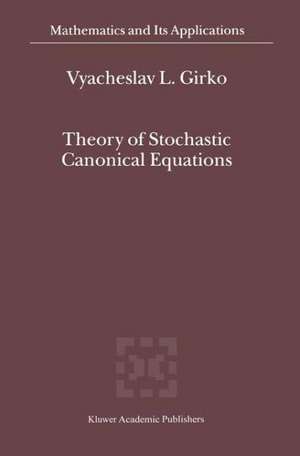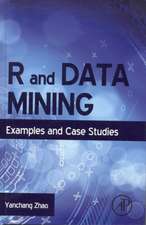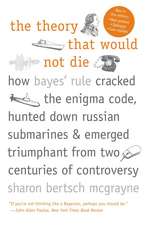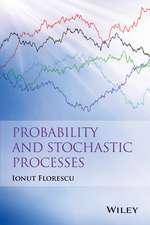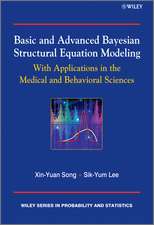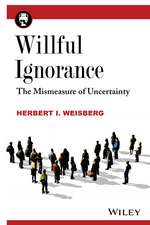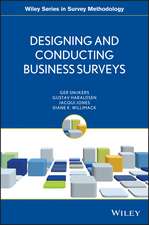Theory of Stochastic Canonical Equations: Volumes I and II: Mathematics and Its Applications, cartea 535
Autor V.L. Girkoen Limba Engleză Hardback – 31 oct 2001
All fifty-nine canonical equations are derived and explored along with their applications in such diverse fields as probability and statistics, economics and finance, statistical physics, quantum mechanics, control theory, cryptography, and communications networks. Some of these equations were first published in Russian in 1988 in the book Spectral Theory of Random Matrices, published by Nauka Science, Moscow.
An understanding of the structure of random eigenvalues and eigenvectors is central to random matrices and their applications. Random matrix analysis uses a broad spectrum of other parts of mathematics, linear algebra, geometry, analysis, statistical physics, combinatories, and so forth. In return, random matrix theory is one of the chief tools of modern statistics, to the extent that at times the interface between matrix analysis and statistics is notably blurred.
Volume I of Theory of Stochastic Canonical Equations discusses the key canonical equations in advanced random matrix analysis. Volume II turns its attention to a broad discussion of some concrete examples of matrices. It contains in-depth discussion of modern, highly-specialized topics in matrix analysis, such as unitary random matrices and Jacoby random matrices.
The book is intended for a variety of readers: students, engineers, statisticians, economists and others.
| Toate formatele și edițiile | Preț | Express |
|---|---|---|
| Paperback (1) | 842.80 lei 38-45 zile | |
| SPRINGER NETHERLANDS – 9 mar 2012 | 842.80 lei 38-45 zile | |
| Hardback (1) | 867.79 lei 38-45 zile | |
| SPRINGER NETHERLANDS – 31 oct 2001 | 867.79 lei 38-45 zile |
Din seria Mathematics and Its Applications
- 9%
 Preț: 627.25 lei
Preț: 627.25 lei - 18%
 Preț: 945.62 lei
Preț: 945.62 lei - 15%
 Preț: 648.42 lei
Preț: 648.42 lei - 15%
 Preț: 651.99 lei
Preț: 651.99 lei - 15%
 Preț: 591.61 lei
Preț: 591.61 lei -
 Preț: 394.29 lei
Preț: 394.29 lei - 18%
 Preț: 950.17 lei
Preț: 950.17 lei - 15%
 Preț: 586.85 lei
Preț: 586.85 lei - 5%
 Preț: 655.17 lei
Preț: 655.17 lei - 15%
 Preț: 658.70 lei
Preț: 658.70 lei - 15%
 Preț: 648.56 lei
Preț: 648.56 lei - 15%
 Preț: 604.84 lei
Preț: 604.84 lei -
 Preț: 394.87 lei
Preț: 394.87 lei - 15%
 Preț: 651.84 lei
Preț: 651.84 lei -
 Preț: 374.76 lei
Preț: 374.76 lei -
 Preț: 394.51 lei
Preț: 394.51 lei - 15%
 Preț: 706.30 lei
Preț: 706.30 lei -
 Preț: 391.02 lei
Preț: 391.02 lei -
 Preț: 389.70 lei
Preț: 389.70 lei - 15%
 Preț: 585.04 lei
Preț: 585.04 lei - 15%
 Preț: 653.98 lei
Preț: 653.98 lei - 15%
 Preț: 587.02 lei
Preț: 587.02 lei - 20%
 Preț: 577.43 lei
Preț: 577.43 lei -
 Preț: 395.47 lei
Preț: 395.47 lei - 15%
 Preț: 601.88 lei
Preț: 601.88 lei - 15%
 Preț: 594.53 lei
Preț: 594.53 lei - 15%
 Preț: 651.84 lei
Preț: 651.84 lei - 15%
 Preț: 649.06 lei
Preț: 649.06 lei -
 Preț: 392.21 lei
Preț: 392.21 lei - 15%
 Preț: 649.06 lei
Preț: 649.06 lei - 15%
 Preț: 643.48 lei
Preț: 643.48 lei -
 Preț: 389.49 lei
Preț: 389.49 lei
Preț: 867.79 lei
Preț vechi: 1141.83 lei
-24% Nou
Puncte Express: 1302
Preț estimativ în valută:
166.06€ • 177.57$ • 138.45£
166.06€ • 177.57$ • 138.45£
Carte tipărită la comandă
Livrare economică 14-21 aprilie
Preluare comenzi: 021 569.72.76
Specificații
ISBN-13: 9781402000751
ISBN-10: 1402000758
Pagini: 1016
Ilustrații: XLVIII, 960 p.
Ediția:2001
Editura: SPRINGER NETHERLANDS
Colecția Springer
Seria Mathematics and Its Applications
Locul publicării:Dordrecht, Netherlands
ISBN-10: 1402000758
Pagini: 1016
Ilustrații: XLVIII, 960 p.
Ediția:2001
Editura: SPRINGER NETHERLANDS
Colecția Springer
Seria Mathematics and Its Applications
Locul publicării:Dordrecht, Netherlands
Public țintă
ResearchCuprins
List of basic notations and assumptions. How the stochastic canonical equation was found. 1. Canonical equation K1. 2. Canonical equation K2· Necessary and sufficient modified Lindeberg's condition. The Wigner and Cubic laws. 3. Regularized stochastic canonical equation K3 for symmetric random matrices with infinitely small entries. 4. Stochastic canonical equation K4 for symmetric random matrices with infinitely small entries. Necessary and sufficient conditions for the convergence of normalized spectral functions. 5. Canonical equation K5 for symmetric random matrices with infinitely small entries. 6. Canonical equation K6 for symmetric random matrices with identically distributed entries. 7. Canonical equation K7 for Gram random matrices. 8. Canonical equation K8. 9. Canonical equation K9 for random matrices whose entries have identical variances. 10. Canonical equation K10· Necessary and sufficient modified Lindeberg condition. 11. Canonical equation K11· Limit theorem for normalized spectral functions of empirical covariance matrices under the modified Lindeberg condition. 12. Canonical Equation K12 for random Gram matrices with infinitely small entries. 13. Canonical Equation K13 for random Gram matrices with infinitely small entries. 14. The method of random determinants for estimating the permanents of matrices and the canonical equation K14 for random Gram matrices. 15. Canonical EquationK15 for random Gram matrices with identically distributed entries. 16. Canonical Equation K16 for sample covariance matrices. 17. Canonical Equation K17 for identically distributed independent vector observations and the G2-estimators of the real Stieltjes transforms of the normalized spectral functions of the covariance matrices. 18.Canonical equation K18 for the special structure of vector observations. 19. Canonical equation K19. 20. Canonical equation K20· Strong law for normalized spectral functions of nonselfadjoint random matrices with independent row vectors. Simple rigorous proof of the strong Circular law. 21. Canonical equation K21 for random matrices with independent pairs of entries with zero expectations. Circular and Elliptic laws. 22. Canonical equation K22 for random matrices with independent pairs of entries. 23. Canonical equation K23 for random matrices with independent pairs of entries with different variances and equal covariances. 24. Canonical equation K24 for random G-matrices with infinitesimally small random entries. 25. Canonical equation K25 for random G-matrices. Strong V-law. 26. Class of canonical V-equation K26 for a single matrix and a product of two matrices. The V-density of eigenvalues of random matrices such that the variances of their entries form a doubly stochastic matrix. 27. Canonical equation K27 for normalized spectral functions of random symmetric block matrices.
Notă biografică
Vyacheslav L. Girko is Professor of Mathematics in the Department of Applied Statistics at the National University of Kiev and the University of Kiev Mohyla Academy. He is also affiliated with the Institute of Mathematics, Ukrainian Academy of Sciences. His research interests include multivariate statistical analysis, discriminant analysis, experiment planning, identification and control of complex systems, statistical methods in physics, noise filtration, matrix analysis, and stochastic optimization. He has published widely in the areas of multidimensional statistical analysis and theory of random matrices.
